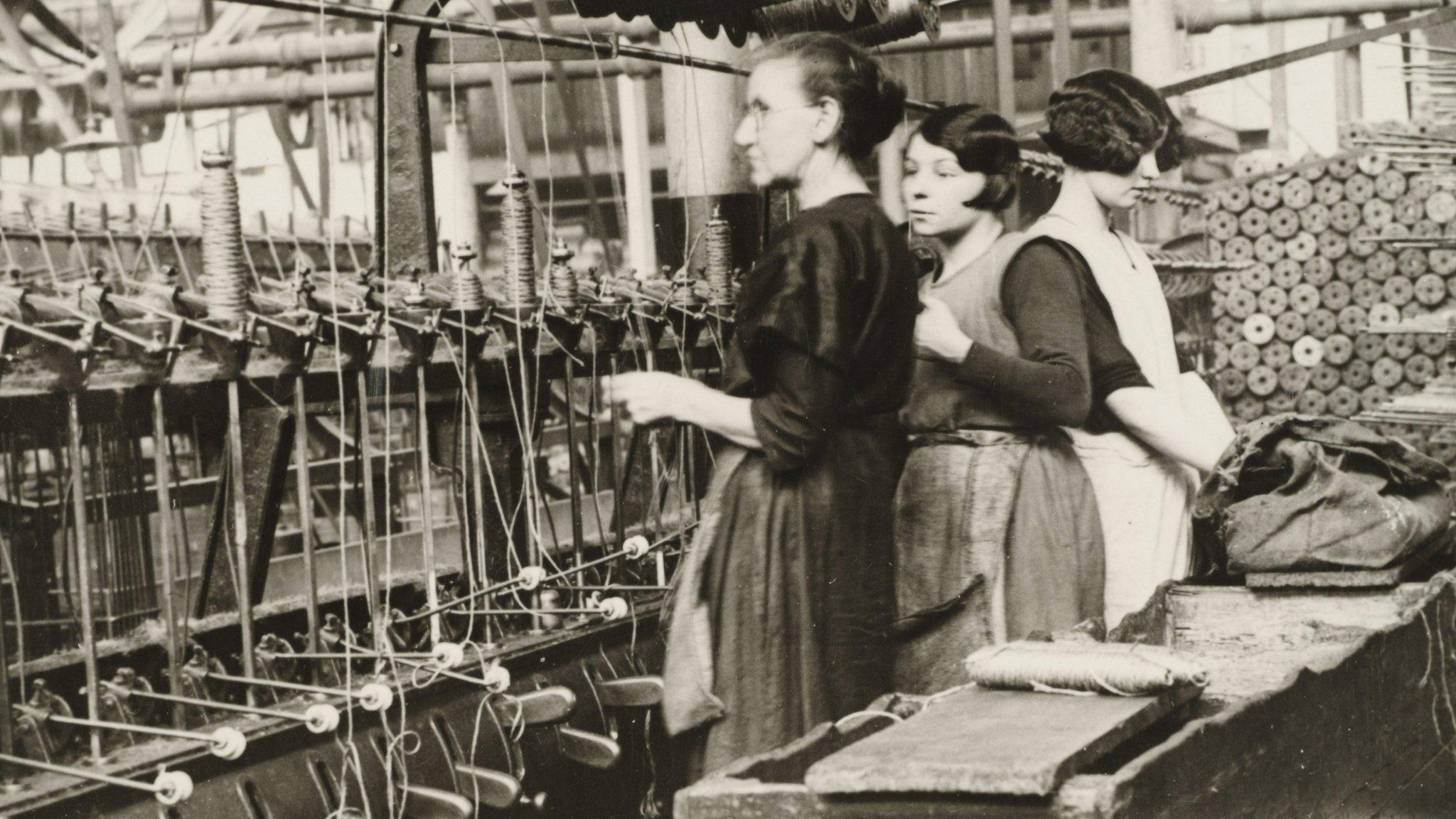'Making capitalism better', and in Dundee
- Published

Katherine Garrett-Cox foresees more of a shift to sustainable investments
You can check prices on your share portfolio on a digital ticker tape along the side of a mildly forbidding black office block in central Dundee. It's a low key building on Marketgait, next to the Methodist church, and you have to peer closely to see who works inside.
Two hundred people do, for Alliance Trust. With more than £3bn of assets under management, there are small offices in Edinburgh and behind the Bank of England in London, for a handful of managers who choose to work there, and for some marketing staff.
But the dominant view from Alliance Trust is of the Tay. For 125 years, it's been applying canny Dundonian principles to managing other people's money.
It's celebrated the occasion by hooking up with its biggest single investor, DC Thomson - not just a big publisher in the city, but a family firm that's squirrelled away a huge investment pot - to create a series of cartoons.
So it is that you meet Dennis the Menace in the front lobby, menacingly eyeing his piggy bank with a view to the purchase of a new catapult.
In the small print, the publisher is keen to stress that this is not to be interpreted as a recommendation to invest with Alliance Trust. That's just in case anyone is tempted to take their financial advice from a cartoon character obsessed with making mischief and torturing Walter the Softy.
'Creative' purple
Every year for 45 years, Alliance Trust has increased the dividend it pays investors, which is, I'm told, a track record shared with no more than five other FTSE companies.
Its image has not been an exciting one. It's staid and low-key. But on moving into the new headquarters four years ago, its chief executive sought to change that mindset a bit, contrasting that black exterior with a 'creative' range of light purples and a lot of light.
She's Katherine Garrett-Cox. She's been in the top job for six years. In the male-dominated and frankly unglamorous world of fund management, she tends to get noticed, trailing in her wake the nickname of Katherine the Great.
But it wasn't for the familiar questions about being one of the most powerful women in Scotland that I went to meet her at the Dundee office. It was to find out more about the company's role in the city, about an unwelcome encounter she faced with a shareholder in recent years, and about how the independence referendum is affecting the investment environment.
Recruiting to Dundee
On the latter point, she observes: "Interestingly, it's a question being asked more by English-based investors than Scottish-based.
"They understand the debate is just starting, and they understand from our point of view, that clearly we're going to be looking after our shareholders best interests. And as more detail becomes available, we'll be analysing that, to see the potential impact, not just on Scotland, but on us, being based here."
She's not the only one in the sector to find more nervousness south of the border than to the north.
Garrett-Cox is in London most weeks, addressing such anxieties, talking to investors, making sure this outpost of the financial sector doesn't get overlooked. And she enthuses about working in an office which is only 10 minutes from the nearest airport, with direct links to London City.
Being based so far from other financial headquarters, she says, has not been the problem it might have been.
She says: "When I moved up from London, it was one of the things I was most fearful of. It did worry that it would be difficult to get the right calibre of people to be based here. And in the six years I've been here, that's the last thing I've had to worry about.
"Good people attract good people. We attract a lot by word of mouth. That creates a more sustainable organisation."
'More resilient'
So if not recruitment, what has she had to worry about? Step forward hedge fund Laxey Partners, which had 1.7% of Alliance Trust stock, and went after the chief executive with pressure for a change of strategy, complaining about under-performance. The issue was that the discount (the gap between the sum of the portfolio's parts and the valuation of the company) was too big.
At the AGM in April last year, Garrett-Cox comfortably saw off the challenge. The discount is consistently lower these days, but she admits that it was a bruising experience.
"It took time, energy and effort," she says. "The way we managed it was dignified and ultimately effective. We came out of it with a strong victory - 80% of our investors backed us, and we've moved on.
"There's no doubt it was a learning experience for us, and the most important thing that I reflect upon is that the company is now more resilient."
But didn't Laxey Partners have a point about under-performance, and wasn't this perhaps a help to changing Alliance Trust for the better?
"Some of the points they made, we didn't fundamentally disagree with," replies Garrett-Cox. "What we disagreed with was how to address it."
She emphasises the longer-term approach taken by most Alliance Trust shareholders: "You can't change an organisation like Alliance Trust overnight, and we need to be mindful about what a whole raft of other investors were wanting."
Risk profile
That longer-term approach is, says the chief executive, what continues to mark out Alliance Trust, while seeking to get sharper about picking and engaging with the right portfolio of investments.
It's cut its range of equities from 200 companies to 110. That portfolio has recently been more than 20% in financials, 14% in healthcare and as much in information technology, with 10% shares for industrials, consumer staples and consumer discretionary.
The latter includes Walt Disney, the third biggest holding, with £64m invested in May. Only Pfizer and United Technologies had bigger Alliance Trust stakes. The US stock market takes up more than 40% of the portfolio, double that of the UK.
The slimmer portfolio doesn't concentrate risk as you might have thought, argues Garrett-Cox, but allows the company to focus better on return from those with which it engages.
'People care...'
Meanwhile, it's pushing into SRI, or sustainable and responsible investment. This is contrasted with ethical investment, which screens out firms that trade in goods and services deemed to be unethical.
Alliance Trust runs an ethical fund, while SRI, explains Garrett-Cox, seeks to match or better any other market index by focussing on companies that do the right things and go about them in the right way.
"What we're saying is the focus of that group in the portfolio is to make capitalism better. So we engage with companies around environmental, social and governance issues. We screen them all, and ultimately, what we're seeing is real change in those areas. We map it against mainstream funds, and these funds have been in the top half of their peer groups."
Having taken on an Aviva SRI fund, the boss sees potential for more: "It's an interesting demographic trend. What we see is that people care a lot more about what companies they're investing in.
"This is a shift that's going to continue. It's about articulating the business case to people that you can invest in a sustainable way, and you're not giving up on the future.
"When you look at Sweden, people have recognised you don't have to compromise on returns."
With 125 years of rising dividends and a canny, scandal-free track record, the Alliance Trust history published earlier this year is one of which the chief executive is proud.
"Not many financial services company would be proud to publish their history, but we're one of them," she says.
"We've got a huge sense of responsibility. For years we've been about investments and savings, and we haven't tried to veer off and do other things.
"If you do what you say, and you deliver on your promise on a regular basis, you can say: 'you know what - financial services isn't all bad'."
You can hear Katherine Garrett-Cox interviewed on Business Scotland, at 10:00 on Sunday 7 July on BBC Radio Scotland, and also on the iPlayer and by free download. The interview is part of a special report from Dundee, looking also at the city's economic past and at the future of its waterfront development.
- Published7 July 2013
